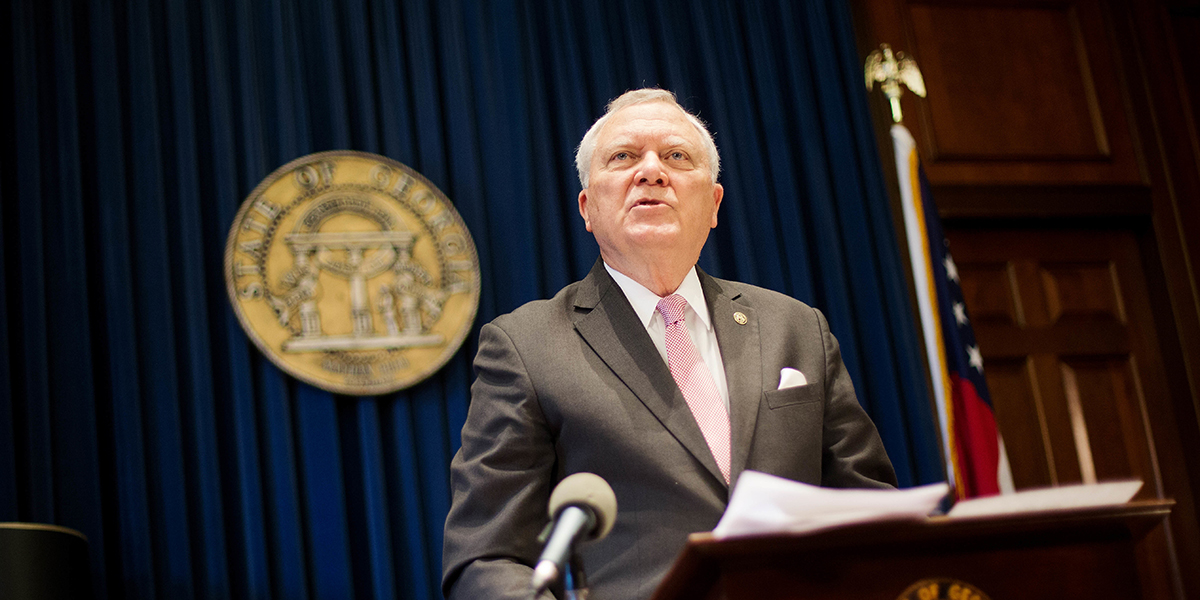Gov. Deal On Medicaid Cuts In Senate Bill: ‘That Needs To Be Done’

Georgia Gov. Nathan Deal speaks during a press conference as he announces he has vetoed legislation allowing clergy to refuse performing gay marriage and protecting people who refuse to attend the ceremonies, Monday, March 28, 2016, in Atlanta. The Republican rejected the bill on Monday, saying “I have examined the protections that this bill proposes … Continued
David Goldman / Associated Press
Gov. Nathan Deal on Wednesday voiced his support for cuts to Medicaid in a controversial Senate health care bill that experts said would leave Georgia lawmakers with a difficult choice about whether to spend more taxpayer money on health care, or reduce the 1.7 million Georgians who rely on the program.
“There’s a lot of complaint now about decreasing those on the Medicaid rolls,” Deal told WABE, “I quite honestly think that needs to be done, because those states that expanded their Medicaid rolls have included people that really are able to work.”
A spokesperson later clarified Deal’s statements, saying he meant to speak specifically about provisions in the Senate bill that would cut Medicaid funding to states that expanded the program.
Georgia hasn’t expanded Medicaid under the Affordable Care Act.
“The cost of putting someone on a Medicaid program is really, truly expensive to the federal government, as well as to the state,” Deal said.
More than half of Georgia’s Medicaid dollars go to people with disabilities and the elderly, according to the Georgia Department of Community Health.
“The bill overall puts a lot more burden on the state to make choices,” said Bill Custer, a health care policy expert at Georgia State University.
Deal’s statements mark a break from a bipartisan group of governors around the country who have influenced the federal debate over health care.
Republican governors like Ohio’s John Kasich and Nevada’s Brian Sandoval, both of whose states accepted expanded Medicaid funding under the Affordable Care Act, encouraged the U.S. Senate to reject the health care proposal.
Kasich called the bill “not acceptable.”
During debate over a House GOP health care bill in March, Deal voiced concerns states like Georgia that refused to expand Medicaid under the Affordable Care Act, would be “punished.”
On Tuesday, Republican leaders announced they wouldn’t bring the bill up for a vote until after the July 4 recess.
Deal Supports New Subsidies
In addition to changes to Medicaid, Deal said he supports part of the Senate health care bill that would alter federal subsidies for low-income people who don’t qualify for Medicaid.
In Georgia, an estimated 309,000 people are part of what’s known as the “coverage gap.”
Basically, they make too much money to receive Medicaid, but not enough to receive a federal subsidy to pay for insurance under the Affordable Care Act.
Deal said the Senate bill would address that issue. It says people below poverty, who aren’t eligible for Medicaid, would receive federal subsidies.
“I think the idea that they would drop the subsidy program down to include some of those who might have otherwise been on a Medicaid program is the right idea,” Deal said, adding it’s a reform he’s suggested for “a long time.”
But even if a person with a low income who falls in the “coverage gap” received a federal subsidy under the new Senate bill, they may not be able to afford coverage, said Laura Harker, a policy analyst at the left-leaning Georgia Budget and Policy Institute.
That’s because the Senate bill changes the formula through which the subsidy is calculated, Harker said.
“It would raise their out-of-pocket costs significantly, compared to Medicaid,” she said. “Just having those higher costs would make it really difficult for them to use that insurance.”
This story has been updated to include statements from a Deal spokesperson.
9(MDAxODM0MDY4MDEyMTY4NDA3MzI3YjkzMw004))








